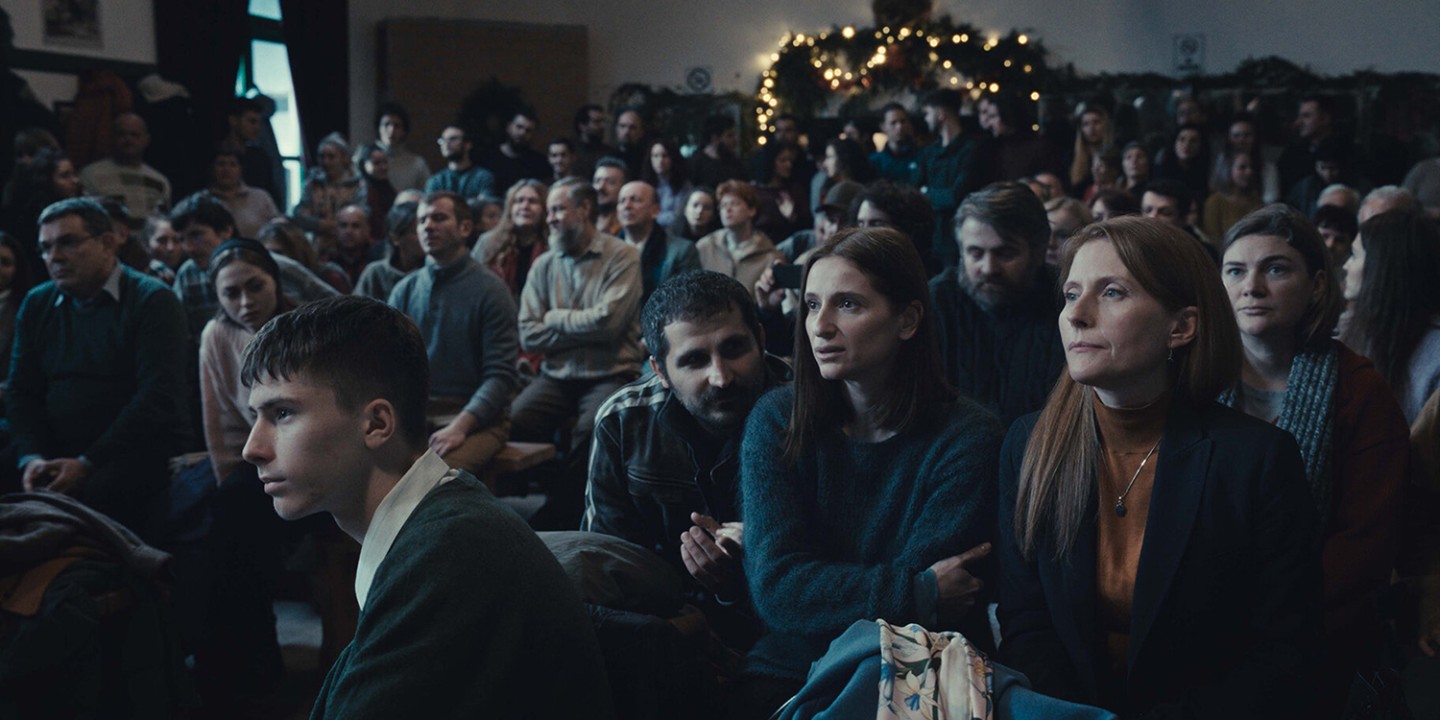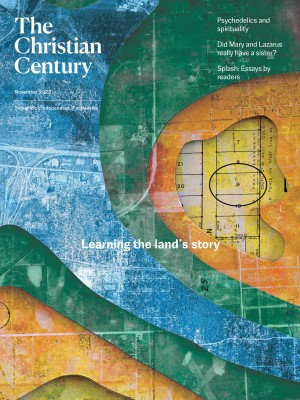R.M.N. is a kaleidoscopic allegory of all of Western civilization
Romanian filmmaker Cristian Mungiu takes a hammer to true-to-life events and then puts the pieces back together again.

Matthias (Marin Grigore, center) and Csilla (Judith Slate, center right) in R.M.N. (Photo: Mobra Films / IFC Films)
R.M.N., the latest film by celebrated Romanian auteur Cristian Mungiu, tells the true story of an incident of racist xenophobia in Transylvania. In 2020, locals in the village of Ditrău organized a campaign of intimidation and exclusion against three Sri Lankan men who had been hired to work in a local bakery.
Mungiu’s film deconstructs a churchgoing community’s Christian hospitality. His approach is effective: he spurns cheap judgments about superficial faith. His Romanian villagers are forbearing and capable of a deeply appealing intimacy; they are also distastefully self-pitying. The result is a film that combines patience and irony in equal measures. Instead of forgiveness, Mungiu’s social realism calls us to accompany his characters in all their human, ethical self-contradictions.
Read our latest issue or browse back issues.
R.M.N. develops the observational filmmaking style of the Romanian New Wave, a cinematic movement that became an international sensation in 2007 with Mungiu’s Palme d’Or-winning 4 Months, 3 Weeks and 2 Days. In that film, Mungiu focuses on two women trying to arrange an illegal abortion during Romania’s communist period. Likewise, R.M.N. follows a pair of characters who share an intimate yet difficult bond: Matthias, home from his job at a German slaughterhouse, tries to reunite with a former lover, Csilla, the bakery’s accountant.
While Matthias is Romanian, Csilla is a member of Romania’s ethnic Hungarian minority. In many parts of Romania’s Transylvania region, Hungarians and Romanians live alongside each other in ethnically-mixed villages. The region was tossed back and forth between the two countries until the late 1940s. An opening long shot follows Csilla as she runs pre-Christmas errands around the village. She knows everyone, and knows which language to use when addressing them—a kind of everyday interethnic etiquette commonplace in rural Eastern Europe.
Matthias, portrayed with aching intensity by Marin Grigore, arrives amid the holiday’s bustle, but his homecoming has little of the season’s joy. He’s fleeing the German police, who want to arrest him for assaulting an abusive boss. He equivocates when the villagers ask if he’s come back to celebrate with his wife and young son.
Although Matthias moves back in with them, neither is happy to see him. His wife resents the flame he still carries for Csilla, played by a masterful Judith State. Rudi, his son, has mysteriously stopped speaking. Matthias wants Rudi to see a doctor, but he also scowls philosophically about masculinity and toughness. Rudi is terrified of the woods, so Matthias drags him outside town with a shotgun for target practice.
Mungiu portrays the labor migrant’s dilemma, by no means unique to the millions of Romanians who, like Matthias, do the work of putting food on Europe’s tables. The impetus for working abroad isn’t simply the “entrepreneurial opportunities” so beloved of American politicians on both the right and the left. In Germany, Matthias sought a temporary escape from an emotionally desiccated marriage, an unhappy state of personal affairs that he himself helped create with his longing for Csilla. He left not just for a better life but to escape his own problems.
But sacrifice for one’s family remains one of the only acceptable public reasons for such leave-taking. The result is that many labor migrants romanticize relationships that they themselves have damaged. When old resentments rear their ugly heads and home isn’t as nice as they’d hoped, they overperform their social roles or try to convince skeptical friends about the harsh wisdom they learned abroad.
Mungiu has created a successful formula by pulling true-to-life events, drawn from recent Romanian history, out of their original contexts. R.M.N. is not set in Ditrău, the actual village in Romania where the 2020 incident took place. While Mungiu portrays one of Transylvania’s ethnically mixed villages, in reality Ditrău is an ethnic Hungarian enclave. For three years, I conducted cultural anthropological research in a town not far from Ditrău, and I discovered during my visits to the village that few Romanians live there.
Watching R.M.N., my knowledge of the place led me to interpret the film through this local perspective. The plot’s dramatic high point is a tour de force ten-minute single shot of a town hall assembly. The chilling scene uses actual dialogue from a meeting where Ditrău residents— some of whom I know personally—shouted racist bile about the Sri Lankan men. But the scene also left me impressed at Mungiu’s observational dexterity, the way he hints at broader social processes outside the immediate scope of his camera lens.
Prior to the incident in Ditrău, Hungary’s Christian nationalist government, led by xenophobic prime minister Viktor Orbán, spent ten years laying the groundwork for it. Orbán’s first act after taking power in 2010 was to grant citizenship to ethnic Hungarians living in Hungary’s border states. Romania’s million-strong Hungarian minority, almost 10 percent of Hungary’s population, suddenly became voting participants in Hungarian elections. Since then, Transylvanian Hungarians have returned Orbán’s favor. More than 95 percent of them cast votes for his party in the last three elections.
Orbán has used this opportunity to assert control over ethnic minority institutions. In 2021 alone, the government allocated 250 million Euros to Hungarian communities in Transylvania. Orbán used the money to close schools and organizations that he could not directly control—and then open new ones whose funding comes directly from his office. He did the same with newspapers and TV stations. Hungarian-language media in Transylvania is now completely dependent on Orbán for its funding and parrots his Christian nationalist rhetoric.
The rhetoric to which the villagers give voice is not autochthonous. It was preceded by Orbán’s Christian nationalism, which in turn was influenced by American right-wing culture warriors like Tucker Carlson, who visited Hungary in 2022 and lauded the state’s total control of the media.
None of this is explicit in Mungiu’s film, but that’s not the point. Mungiu takes a hammer to true-to-life events and then puts the pieces back together again. For Mungiu, contemporary Romania is a kaleidoscopic allegory of Europe. Or, from another angle, of neoliberal capitalism. From yet another, the whole of Western civilization. His international audiences find themselves in his films and then reflect on their own roles in tales that are surprisingly refractory for all their topicality.
In this sense, R.M.N. could also be a provocation for liberal Christians to reconsider our belief in the inherent power of moral rhetoric, not to mention our confidence that we will always control the educational and media institutions through which society instills values in future generations. In one dramatic scene, a Catholic priest disagrees with his parishioners when they block the church doors against the Sri Lankan men. Eventually, the priest changes his tune. So do Csilla’s other friends, leaving her alone to exhort the villagers to Christian hospitality.
The racism that corrodes European culture from within is neither indigenous to rural life nor a tit for tat response to Romanians’ brutal treatment on the European labor market. Instead, the conflict in Ditrău was a marginal skirmish in conservative Christians’ bigger war of state-enforced oppression against socially marginalized groups.
As a progressive Christian who has taken to print to denounce Orbán’s xenophobia, I found in R.M.N. an invitation to turn a realistic eye on my rhetoric about the morality of welcoming the stranger. Will the most affecting moral exhortation stem the tide of racism when the latter is backed up by armed police, money, and incessant propaganda? In the face of conservative Christians’ embrace of state power to advance their exclusionary immigration policies, liberal talk about hospitality is sentimental poppycock, if we are not also ready to make use of the long arm of the state.





